Opportunities and challenges
English has long been considered the “key” to integration, but in high schools, learning a foreign language often focuses more on “learning for exams” than “learning for use”. In that context, Ninh Binh has boldly implemented an English introduction program right from primary school, creating an important foundation for the new generation of students.
According to the 2024-2025 school year report, the whole province has up to 94,414 first and second graders voluntarily participating in English classes with a duration of 2 periods/week. They not only access foreign languages through books, but also participate in many useful playgrounds such as English Festival, international exchange activities with students from India, Japan, and Bangladesh.
Ms. Nguyen Thi My - Principal of Ninh Giang Primary School (Tay Hoa Lu, Ninh Binh) said that the most gratifying thing is that students no longer consider English a boring subject, but are increasingly interested in playing games, singing and communicating in foreign languages. With the new financial mechanism from Resolution No. 71-NQ/TW, the school has the conditions to invest in more multi-purpose classrooms, invite native teachers to teach directly, thereby helping to make learning English more lively and effective.
Sharing the same opinion, Ms. Hoang Thi Minh Nguyet - Principal of Tran Bich San Secondary School ( Nam Dinh , Ninh Binh) assessed that Resolution No. 71-NQ/TW not only provides a legal corridor, but also opens up opportunities for students to be more confident when using English in their studies and life. When the school is given financial autonomy, we can invest in smart foreign language classrooms, enhance teacher training, and organize many international exchange activities, things that were previously very difficult.
In reality, despite many obstacles, especially the difference in infrastructure between favorable and disadvantaged areas, Ninh Binh has flexibly taken advantage of the new financial mechanism from Resolution No. 71-NQ/TW to mobilize socialized resources in combination with the State budget.
Many schools have boldly invested in smart foreign language classrooms, interactive boards, and online software, creating conditions for students to experience a modern learning environment. Teachers have more opportunities to participate in advanced training courses, and students have expanded international playgrounds to challenge and mature.
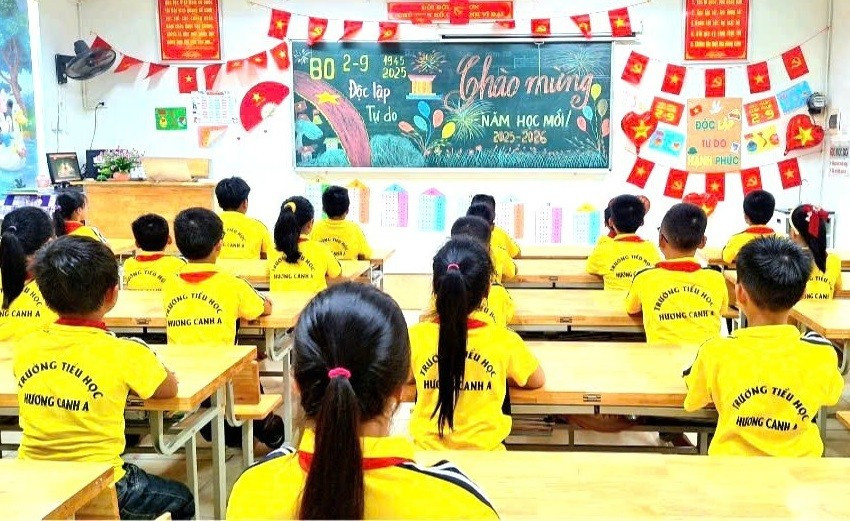
From another perspective, Ms. Nguyen Thi Thai - Principal of Tho Son Secondary School (Thanh Mieu, Phu Tho ) commented that Resolution No. 71-NQ/TW is a correct policy, with long-term strategic significance. If implemented synchronously and drastically with a suitable roadmap, students' foreign language proficiency will certainly improve, meeting the requirements of high-quality human resources in the integration period.
However, the Principal of Tho Son Secondary School frankly shared many difficulties. Accordingly, the English teaching staff has uneven qualifications; facilities and equipment for foreign language teaching are lacking and inconsistent; some teachers are confused in organizing practical communication activities, especially in listening and speaking skills of students. Besides, the foreign language learning environment outside of regular school hours is limited.
Sharing the same view, Ms. Ngo Thi Nhu Lan - Principal of Huong Canh A Primary School (Binh Nguyen Commune, Phu Tho), said that this is a breakthrough, strategic policy and in line with the development trend of the country. Gradually improving the quality of teaching and learning foreign languages in general schools will help students have the ability to approach countries in the region, and at the same time be more confident in the international learning environment.
However, the school currently does not have enough English classrooms; although the number of teachers is sufficient and most of them meet the new requirements, there are still many difficulties. Notably, the number of students in a class is much higher than the standard for a foreign language class; in addition, the majority of foreign language teachers are old, so the application of digital transformation and artificial intelligence in teaching is still limited.
“In implementing Resolution No. 71-NQ/TW, the school will synchronously deploy many solutions to improve the quality of teaching and learning English. In particular, it will focus on training teachers to use technology applications and artificial intelligence to design lessons, create test questions and assess students' abilities.
At the same time, organize training on digital transformation skills in teaching; strengthen coordination with parents to support and tutor students in self-study at home, making up for the time in class that is not enough for students to deeply understand and grasp knowledge," Ms. Ngo Thi Nhu Lan shared.

Innovating methods, aiming for English as a second language
For English to truly enter school life, the quality of the teaching staff is a key factor. Ninh Binh has organized many training courses, from teaching methods according to the 2018 General Education Program to applying information technology in teaching. Notably, last school year, the Department of Education and Training deployed 8 training courses on applying artificial intelligence (AI) to support English speaking skills for both teachers and students.
Ms. Bui Thi Lan - English teacher, Ly Nhan Tong High School (Tan Minh, Ninh Binh) shared that in the past, students were often afraid to communicate because they were afraid of making mistakes. But with AI tools, they can practice pronunciation at any time, receive immediate feedback and gradually become more confident. Innovating the financial mechanism according to Resolution No. 71-NQ/TW helps schools easily access modern equipment and software, while creating conditions for teachers to participate in many in-depth training courses.
At the same time, Ninh Binh promotes the model of cross-border lessons, connecting with schools in many countries. Ms. Nguyen Thi Thanh Hoa - English teacher, Tran Bich San Secondary School (Nam Dinh, Ninh Binh) said that through cross-border lessons, students are trained the most in listening and speaking skills, and are more confident in communication. Online lessons have created a vibrant space where students from different countries explore new knowledge, practice skills and expand their understanding of culture.
According to teacher Tran Thi Thanh Nga - Tho Son Secondary School, teachers need to proactively innovate, participate in training courses, apply digital technology and artificial intelligence to prepare lessons and assign online lessons, helping students develop the habit of self-study. At the same time, teachers need to guide students to exploit authentic documents, practice communication through games and real-life situations in the classroom.
Another issue is testing and assessing students’ English proficiency. Ms. Tran Thi Thanh Nga said that currently, testing speaking and listening skills is difficult due to large class sizes, limited time, and uneven equipment quality. Meanwhile, reading, writing, and grammar skills require a lot of practice time, but in class, teachers often only have time to teach theory.
To overcome this, Ms. Tran Thi Thanh Nga suggested that it is necessary to build an open and public question bank to help students practice regularly. At the same time, the Ministry of Education and Training needs to develop a self-study website, providing free question banks and practice exercises for both teachers and students.
English teacher Nguyen Thi Thu Phuong - Huong Canh A Primary School believes that teachers need to innovate teaching and assessment methods so that students can use English effectively, instead of studying just for exams. Teachers play the role of organizers, supervisors, helpers and assessors.
Students actively approach, exploit, use language, and evaluate their peers under the guidance of teachers. This creates many opportunities for students to use language in class, while forming and developing competencies and qualities according to the 2018 General Education Program.
At the same time, assessment methods need to create motivation and support by finding out the weak points of students, from which teachers can take timely measures to support students. However, there needs to be synchronization in regular and periodic assessment and new test surveys to be effective. When the test survey is still heavily academic, it is very difficult for teachers to both teach students foreign language skills and do well on academic tests.
“To effectively implement Resolution No. 71-NQ/TW, it is necessary to have the synchronous participation of all levels and sectors: Supplementing staff, training teachers; investing in standard facilities and equipment; building a rich foreign language learning environment”. - Ms. Nguyen Thi Thu Phuong - teacher of Huong Canh A Primary School
Source: https://giaoducthoidai.vn/ky-vong-doi-moi-day-va-hoc-tieng-anh-tu-nghi-quyet-71-post749486.html



![[Photo] Cutting hills to make way for people to travel on route 14E that suffered landslides](https://vphoto.vietnam.vn/thumb/1200x675/vietnam/resource/IMAGE/2025/11/08/1762599969318_ndo_br_thiet-ke-chua-co-ten-2025-11-08t154639923-png.webp)





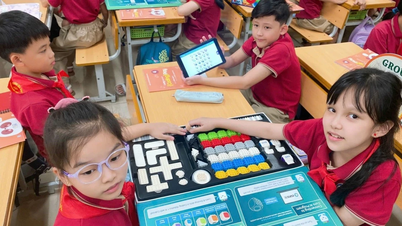
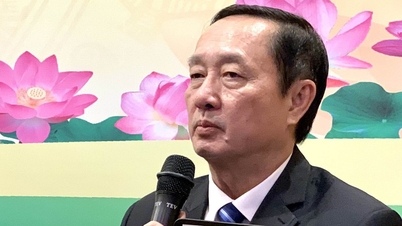

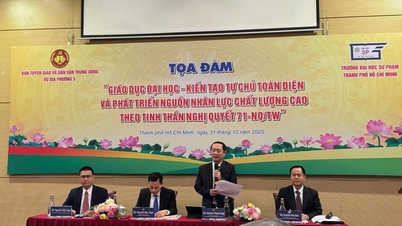



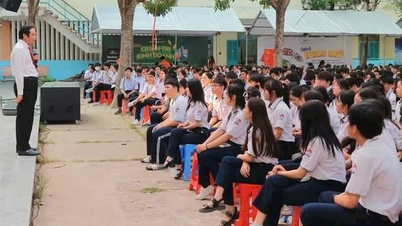
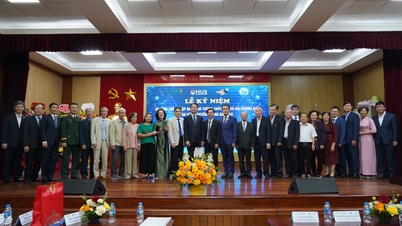




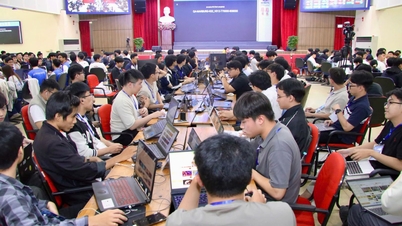




















![[Video] Hue Monuments reopen to welcome visitors](https://vphoto.vietnam.vn/thumb/402x226/vietnam/resource/IMAGE/2025/11/05/1762301089171_dung01-05-43-09still013-jpg.webp)

































































Comment (0)